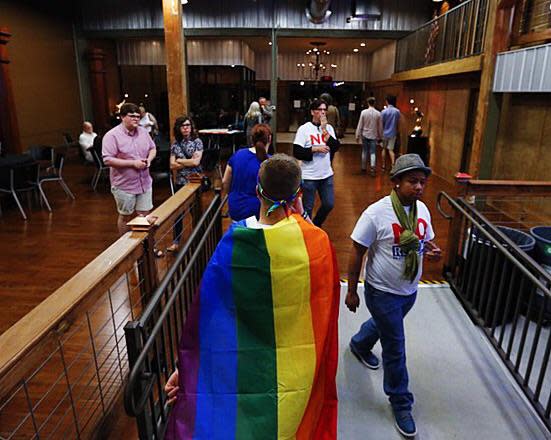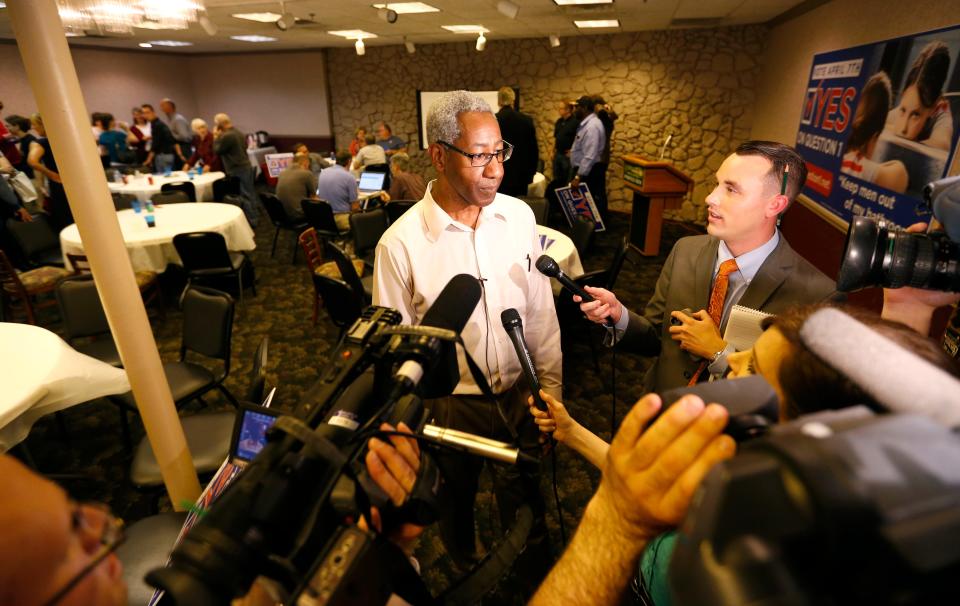'We lost people': LGBTQ community grapples with last decade's SOGI fight while wondering what's next
Sparked by renewed interest at City Hall, Springfield's LGBTQ community met Tuesday night to relive the pain of 2015's repeal of citywide nondiscrimination protections for gay and transgender Springfieldians — and decide whether it's worth it to go through that fight again.
The Sexual Orientation and Gender Identity ordinance, or SOGI for short, was first passed by city council in 2014. The ordinance prohibited discrimination in employment, housing, and public accommodations on the basis of an individual's sexual orientation or gender identity.
In layman's terms, it provided legal recourse for gay or trans Springfieldians who believed they were discriminated against on the basis of their identity.
But soon after its passage, petitions were gathered for the ordinance's repeal and the issue was placed on the ballot seven years ago. After just six months on the books, SOGI was repealed by a vote of the people — but only by a 3 percentage point margin. The vote has returned to public consciousness as a result of Monica Horton's appointment to Springfield city council — saying in her appointment interview that council should again consider passing a Sexual Orientation and Gender Identity Non-discrimination ordinance.
More: Pride Month officially recognized by Nixa mayor amid queer book banning

The Springfield community has a variety of responses
That advocacy drew mixed responses from the LGBTQ community in Springfield — ranging from those worried about the effects of another loss to those scared by the discrimination they face without protections.
Collins Chatwin, a facilitator at the GLO Center's youth group, was an organizer during the 2015 campaign against the repeal. Though calling it a "galvanizing moment" for Springfield's LGBTQ community, they "just can't think about" fending off another recall when success is not guaranteed — especially considering the pain and suicidal ideation of many in the community that followed the 2015 loss.
"Some folks out there are trying to put something on the ballot and I basically just tried to explain the clear harms that come from having this fight in such a public way. We lost people," a shaking Chatwin told the room.
"And I'm aware of the opposition and what powers they have. That hasn't diminished in the last seven years. Their fire, their money, their drive hasn't gone down. And I just...I don't see a certain win out of it," they said.
More: Springfield's short-lived SOGI ordinance protected gay, trans residents. Is it time to try again?
"So I would like to ask city council to please not add the non-discrimination protections because it would certainly lead to a repeal effort which would be harmful, in my opinion, to the community as a whole."
That sentiment was echoed by Ashley Quinn, another 2015 organizer. He recalled walking through the grocery store the morning after SOGI was repealed — wondering if the cashier or the person behind him in line had voted to take his rights away as a queer and transgender man.
"I remember walking around the grocery store the next day being like, 'did that person vote to take rights away from me?' It just felt like half of Springfield voted against it. I just feel like we have this gaping wound in our community and it's just — it's not healing and it's, it's just festering. And every now and then, someone brings up a conversation like this and I'm just like, I'm really good again now. Like it was a lot and it was hard and it hurt. I don't know if I can do it again."
Previously: Some want to revisit LGBTQ protections in Springfield. Advocates say it could backfire.
Instead, Quinn believes the community should focus on statewide protections through MONA legislation, saying it's a more realistic and impactful goal. The Missouri Nondiscrimination Act has been introduced in the state legislature for the past couple of decades but has yet to pass.
Quinn also noted how the legal landscape has changed since the 2015 repeal. A 2020 Supreme Court ruling found the Civil Rights Act of 1964 to prohibit employment discrimination on the basis of sexual orientation and gender identity — though not housing or public accommodation protections.
"Employment protections are there. If people are getting fired right now for being gay or trans, they have recourse. And there were some Trump appointees, at least, who voted for that. So I don't think that that's at a super risk of going away," Quinn said of the ruling.
More: City council adopts equity and inclusion guidelines, incorporates them into official priorities
In his remarks, Quinn pointed out an "unfriendly" person in the crowd — warning that Calvin Morrow had attended the public event.

More: A Timeline of the SOGI issue
A pastor and executive director of Christians United for Political Action, Morrow was a leading spokesman for the campaign against LGBTQ protections and was instrumental to the success of the repeal effort in 2015.
Asked why he attended the event put on by his political opponents, Morrow told the News-Leader he was "gathering information."
"I was a little taken aback by the the gentleman who spoke first who mentioned I may be unfriendly. I may be unfriendly to the ordinance but I'm never unfriendly to the people," Morrow said.
More: GLO Center invites LGBTQIA+ youth to get creative during second children's event
' I don't feel like we're thriving if we don't have the basic human rights'
Meanwhile, current GLO President Arianna Beckham asked city leaders to pass nondiscrimination protections.
"The GLO Center's mission statement is to have a thriving community. And I don't feel like we're thriving if we don't have the basic human rights — to be denied access to equal rights and have have fear of repercussions for being who we are in the community..." she said. "I think it's important for the city to take a stand, especially a city that says it wants to create more diversity. How can you create diversity when your city is not safe?"
Curtis Vaughn, who is also a Republican U.S. Senate candidate, said the city should pass SOGI — calling it a question of whether gay people have full citizenship.
Vaughn also recalled his experience growing up as a gay teen in Lebanon, Missouri. He and his friends started a Gay-Straight Alliance but were to afraid to call it that.
"We didn't feel safe going to prom. We went to the principal. He told us to stop being gay. People shouted (homophobic slurs) at me out the window as they left. There was a list of gay students to be shot that was found at the grocery store," he said through tears. "All of this was OK. That is not something we can tolerate."
More: What is the history behind Pride Month? How the LGBTQ celebration came to be
'Allies are extremely important, but we are the ones that have to make the decisions'
Krista Moncado had mixed feelings on another SOGI fight, saying it should be an ongoing conversation within Springfield's queer community. But she was adamant no action should be taken by the city without the community's cosign.
"Nothing about us without us. The first time this went to ballot, it was not decided by queer folks. It was decided by well-meaning, straight allies. And I appreciate and love my allies. They've kept me here alive and safe and helped me help others," Moncado said. "Allies are extremely important, but we are the ones that have to make the decisions because it is actually our lives that are being affected."
Moncado noted the high level of suicidality among queer youth, and the possible ill-effects should protections fail by referendum once again.
"How many queer youths had thought about suicide? Seriously considered suicide? It was well over 50 percent. For Black and brown queer and trans youth, it was over 80 percent. That wanted to live. I can't accept that," she said.
Messages for and against a new city nondiscrimination statute were heard by three council members, Andy Lear, Craig Hosmer and Mike Schilling. After the meeting, Lear promised council would not take action on this issue except at the queer community's explicit direction.
"As allies we need to take our direction from the community. And no one should ever vote in an election on whether someone else should have rights," Lear told the News-Leader.
This article originally appeared on Springfield News-Leader: Springfield's LGBTQ community grapples with pain of SOGI fight

